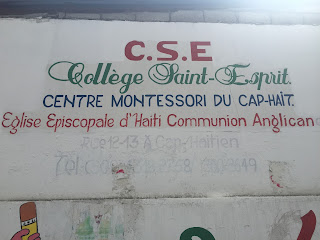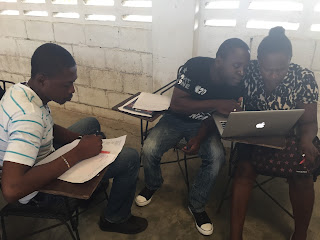The post-Christmas and New Years' lull has given me some time to reflect on what was simultaneously one of the most memorable and perhaps the most challenging holiday season I've ever experienced. While Christmas was particularly hard being away from family and friends, it was also special in that it was the first Christmas in a while where I felt like I was passing more time than in years past thinking about God's vision for humanity and for the world through the birth of Jesus. The greater emphasis I intentionally placed on my faith this holiday season was partly due to being without loved ones, but also due to the knowledge that this year is a special time designated for my spiritual growth and that I should take advantage of it.
Our holiday trip was full of new sights and experiences. We spent some time in Port-au-Prince and the town of Jacmel, in southern Haiti. I got to (try to) dance Kompa, a traditional Haitian musical genre and dance, we visited a Christmas village organized by the Ministry of Culture and artisans in Jacmel, I got some wonderful days and nights of rest at our hotel in Port au Prince, I drank Haitian hot chocolate for the first time and I got to go to the beach on the southern coast.
Our trip was also full of some challenges. Alan got sick fairly early on in the trip, which put some stress on what we had hoped would be a stress-free holiday. I was also, naturally, missing family and friends who were far away. It was particularly challenging getting through a season that is so centered on familial relationships without my own family there. Despite my sadness from missing out on the festivities in North Carolina, however, I remember thinking that this particular Christmas would be forever remembered as a special opportunity to see the season celebrated in Haiti and to lean on God more than ever as a comfort and strength while being away from my home.
Through the praying and journaling I did during and after Christmas, I came to realize that my Christmas was full of blessings this year, just like any year. There was time for fun, time for rest, and even more time than usual for looking inward and doing some hard thinking about what Christmas, in its many forms, can look like for different people in different parts of the world. I have the feeling that it’s the kind of Christmas God wanted me to experience this year—a kind of Christmas that gifted me with a closer understanding of the hope that Jesus’ birth brings to all of us, just as we are-- weary, imperfect and some of us, far from home.
Our trip was also full of some challenges. Alan got sick fairly early on in the trip, which put some stress on what we had hoped would be a stress-free holiday. I was also, naturally, missing family and friends who were far away. It was particularly challenging getting through a season that is so centered on familial relationships without my own family there. Despite my sadness from missing out on the festivities in North Carolina, however, I remember thinking that this particular Christmas would be forever remembered as a special opportunity to see the season celebrated in Haiti and to lean on God more than ever as a comfort and strength while being away from my home.
Through the praying and journaling I did during and after Christmas, I came to realize that my Christmas was full of blessings this year, just like any year. There was time for fun, time for rest, and even more time than usual for looking inward and doing some hard thinking about what Christmas, in its many forms, can look like for different people in different parts of the world. I have the feeling that it’s the kind of Christmas God wanted me to experience this year—a kind of Christmas that gifted me with a closer understanding of the hope that Jesus’ birth brings to all of us, just as we are-- weary, imperfect and some of us, far from home.
The overlook of Port au Prince at the Observatoire bar/restaurant in Petionville
The upstairs bar area at our hotel in Port au Prince
Couples dancing kompa
The lit-up tree at the Village de Noel!
Artisan stands at the Village de Noel in Jacmel. The jewelry and art is incredible; I had to stop myself from buying an eye-catching bracelet fashioned out of a bent spoon.
At the beach in Jacmel
I'll admit, this wasn't taken in Haiti. My brother, Sam, and sister, Caroline, sent me a much-appreciated selfie on Christmas!
Who can add to Christmas? The perfect motive is that God so loved the world.
The perfect gift is that He gave His only Son.
The only requirement is to believe in Him.
The reward of faith is that you shall have everlasting life.
-Corrie Ten Boom




















































